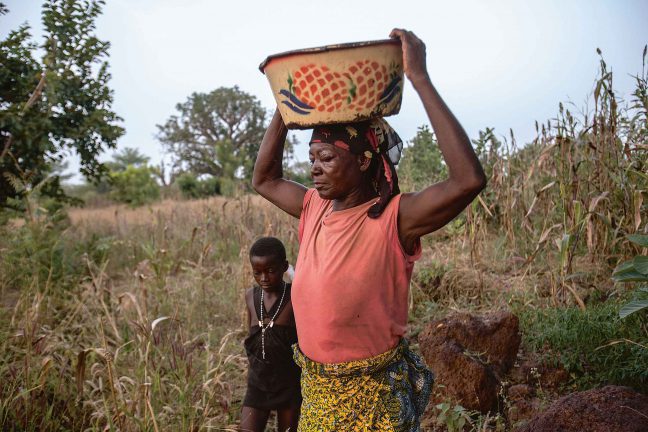In rural Ghana, the odds are stacked against women like Beatrice.
With three orphaned grandchildren in her care, Beatrice struggles to provide for them. “Men are definitely in a better situation,” she says.
Farming is the lifeblood of the region. But women don’t have the same opportunity as men to farm. Only men can own farming land in Ghana. And women can’t independently raise animals, like goats or grow crops, like corn — this work is usually reserved for men.
This makes it hard for 65-year-old Beatrice to earn enough money to feed her grandchildren. Each day she wakes early to crush rocks to sell as gravel.
Beatrice scrapes together about $17 per month for this backbreaking work — and still the children often go hungry.
“When I don’t have money,” she says, “we have to eat small vegetable leaves.”
“We boil them in water. At least you have something in your stomach before you go to bed.”
“I don’t know how the young ones manage. They look so skinny and they lose weight … there is nothing I can do.”
Beatrice worries for the children’s future.
“Very soon, I will become weak and my grandchildren will have to cater for themselves. I am used to being hungry; I don’t want my grandchildren to see how I feel.”
Like many women in rural Ghana, Beatrice would gladly farm or raise livestock if given half a chance.
She says that if she could be part of Oxfam’s livestock rearing program, she “could earn an income.”
“I dream that if I ever get a goat, this means that in time I will have several goats. This will help me pay for food and for my grandchildren’s education,” she says.
Oxfam is working with Ghana’s poorest communities to create opportunities for women, giving them the resources and training they need to make honey, grow crops or breed livestock such as goats.
The training has had a huge impact in 62-year-old Mary’s life. After she learnt how to compost, Mary (pictured above) increased her maize harvest from five bags to twelve.
“I am very proud of one thing: my compost. It has helped me a lot.”
Mary is a grandmother and provider, with six hungry mouths to feed. Farming is vital for her; without it, she would struggle to feed her family.
Gender inequality keeps many women poor in rural Ghana, and leaves their dependent children hungry.
“Men and women don’t have equal opportunities,” Mary explains.
And when the Hungry Season sets in, things get even worse. Between June and August, three out of every four families in rural Ghana don’t have enough food to eat. For the many women without a harvest to rely on, this time of year is especially hard.
Beatrice knows hunger and hardship all too well. “I want women to have a better life,” she says.
The better life that Beatrice dreams of is possible, with your help. Together, we can give women like Beatrice a fair chance to make a living and build a brighter future for the children in their care.
You can change the story for women in Ghana
In rural Ghana, gender equality is keeping women in poverty. Donate today to create pathways for women to earn a living and lift themselves — and future generations — out of poverty.
Photos: Adam Patterson/Oxfam

